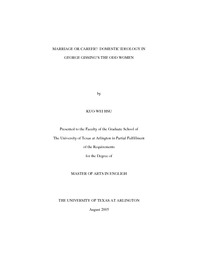
ATTENTION: The works hosted here are being migrated to a new repository that will consolidate resources, improve discoverability, and better show UTA's research impact on the global community. We will update authors as the migration progresses. Please see MavMatrix for more information.
Show simple item record
| dc.contributor.author | Hsu, Kuo-Wei | en_US |
| dc.date.accessioned | 2007-08-23T01:56:16Z | |
| dc.date.available | 2007-08-23T01:56:16Z | |
| dc.date.issued | 2007-08-23T01:56:16Z | |
| dc.date.submitted | July 2005 | en_US |
| dc.identifier.other | DISS-1029 | en_US |
| dc.identifier.uri | http://hdl.handle.net/10106/205 | |
| dc.description.abstract | Although George Gissing is acclaimed for his progressive thoughts on liberating women from patriarchy by establishing financial independence, some critics challenge such praise for Gissing by arguing that he is still confined within patriarchal thinking because he still adheres to domestic ideology, which advocates that women should stay within the domestic sphere and be protected from corruption of the outside world.
The discussion of this thesis is divided into two main parts: first, despite their efforts to fight for freedom in marriage, women fail to escape from the control of patriarchy because through domestic ideology patriarchy still drives women back to the domestic sphere. Secondly, though feminists in the novel claim that women can attain to their ultimate independence by establishing financial independence, they are still confined within domestic ideology since their thinking is still in accordance with the norm of Victorian domestic ideology. | en_US |
| dc.description.sponsorship | Danahay, Martin | en_US |
| dc.language.iso | EN | en_US |
| dc.publisher | English | en_US |
| dc.title | Marriage Or Career? Domestic Ideology In George Gissing's The Odd Women | en_US |
| dc.type | M.A. | en_US |
| dc.contributor.committeeChair | Danahay, Martin | en_US |
| dc.degree.department | English | en_US |
| dc.degree.discipline | English | en_US |
| dc.degree.grantor | University of Texas at Arlington | en_US |
| dc.degree.level | masters | en_US |
| dc.degree.name | M.A. | en_US |
Files in this item
- Name:
- umi-uta-1029.pdf
- Size:
- 492.9Kb
- Format:
- PDF
This item appears in the following Collection(s)
Show simple item record


